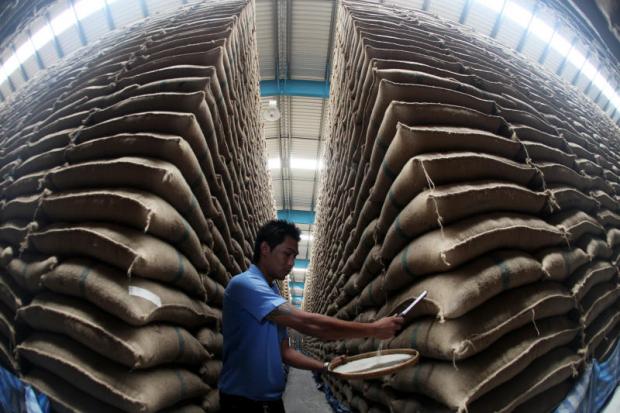
The government looks set to call a bid for inedible-grade rice stocks after having put off sales late last year to curb any potential price impacts on the new harvest.
Adul Chotinisakorn, director-general of the Foreign Trade Department, said the department is scheduled to start calling auctions to sell state rice stocks of substandard and inedible quality, estimated at 2.04 million tonnes, starting from April.
Of the total, 1.5 million tonnes are fit for animal feed production, and 500,000 tonnes are inedible both for humans and animals, only being suitable for fuel or energy production. The remaining 40,000 tonnes was not accepted by the Department of Corrections or the winning bidders.
Mr Adul said authorities handling the rice sales will call bids on a gradual basis in May and June and possibly until July or September to sell the existing stocks.
The government shoulders warehousing costs of 120-130 million baht a month for those rice stocks.
He said the department will propose the bidding plan to the national rice policy committee at its meeting on March 29, adding the selling plan will have no impact on the market, as the existing stocks being put up for auction are of low quality.
Since the May 2014 coup, a total of 14.8 million tonnes of state rice stocks have been sold through auctions, fetching 135 billion baht. Government-to-government rice deals have unloaded 3.44 million tonnes of newly harvested grains which were not a part of the rice stocks, worth 50.2 billion baht.
Mr Adul said Thai rice exports are expected to stay promising this year as global demand remains strong, particularly from China, Indonesia, Malaysia, Japan and the Philippines.
The Philippines is scheduled to hold an auction later this month to import 250,000 tonnes, and many Thai exporters are interested in this deal, he said.
According to the Foreign Trade Department, as of March 12, Thailand has shipped 2 million tonnes worth US$999 million (31.3 million), up 4.17% and 22.1%, respectively, from the same period last year.
Last year, Thailand exported a record 11.6 million tonnes of milled rice, up 17.4% year-on-year, fetching 174.5 billion baht, up 12.8%.
The top five importers of Thai rice were Benin, China, South Africa, Cameroon and the US.
The government forecasts Thailand will export 9.5 million tonnes by the end of this year.
The Agriculture Ministry forecasts rice production for the 2018 season of 32.05 million tonnes of paddy rice, down by 1.17% from the previous season, as farmers in certain areas have shifted to growing other cash crops such as sugar cane and palm oil.
Thailand is estimated to produce 19.2 million tonnes of milled rice this year, down 5.88% from 20.4 million tonnes last year.
Chookiat Ophaswongse, honorary president of the Thai Rice Exporters Association, said relevant authorities have to strictly control the remaining stocks to prevent any releases to the normal edible rice market.
He said domestic rice prices will be hit if 400,000-500,000 tonnes of rice stocks are leaked into the normal market.
In a related development, Mr Adul said the government expects border trade to grow 15% this year from 1.3 trillion baht last year, which had expanded 8.85% from 2016.